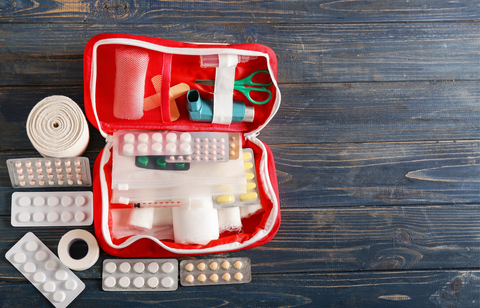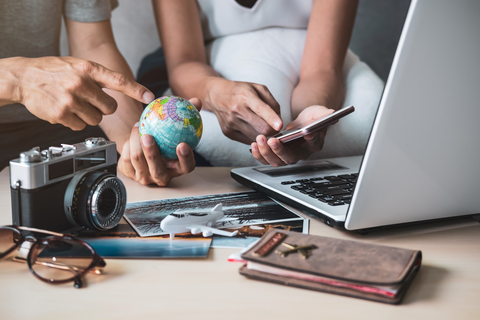Heading off on your first trip, whether it's to another country or just the next state, can be super exciting and a little nerve-wracking. There's plenty to think about, like what to pack and what to expect. It's totally normal to feel a bit scared about it all, especially if it's your first time. But hey, we've got your back! We've put together a simple guide for first-time travelers to help you out.
1) Pack All Your Essential Travel Documents
Credit: Envato Elements/ Prostock-studio
Before you even think about what clothes to pack, make sure you've got all your important documents sorted. This means your passport, any visas (if needed), your ID, and travel insurance details. It’s also a good idea to have a copy of your itinerary, hotel bookings, and any tickets for flights, trains, or events. To keep things extra safe, make duplicates of these documents—take one set with you and leave the other set with a friend or family member back home. Make sure to store them separately from the originals. This way, you're prepared if anything goes missing.
2) Get to Know the Place Before You Visit
It's incredibly helpful to learn a bit about your destination before you get there. This doesn’t mean you have to know everything, but having a basic idea of the place can make your trip smoother. Look up the must-see spots, local scams to avoid, safety tips, local food you want to try, and any cultural dos and don'ts. Understanding a few common phrases in the local language can also be a big help, especially for saying hello, thank you, and asking for directions. Also, check out the weather forecast to get an idea of what clothes to pack.
3) Don't Forget to Pack Safety Essentials
Credit: Envato Elements/ Mrcluxury
Being safe is key, so pack a few items that will help you stay healthy and secure on your trip. Always bring a basic first-aid kit with antiseptic wipes, any personal medications you need, and band-aids. Sunscreen is a must, no matter the weather, to protect your skin. It’s also smart to have hand sanitizer and a reusable water bottle. For extra safety, carry a small flashlight and a portable phone charger.
4) Pack Light
When it comes to packing, less is definitely more. Try to pack only what you really need. Stick to a few versatile outfits that you can mix and match. Choose comfortable shoes that will work for walking and any activities you have planned. Avoid overpacking by laying out everything you think you need, then cutting it down by half. This will save you a lot of trouble at the airport and make moving around easier once you’re at your destination.
5) Keep in Touch with Family and Friends
Credit: Envato Elements/ leungchopan
Staying connected with your loved ones back home is important. Before you leave, make sure your phone works in the place you're visiting, or look into local SIM cards for a cheaper option. Share your itinerary and also hotel details with your family or friends, so they know where you'll be staying and any activities you've got lined up.
6) Keep Your Essentials in Your Carry-On
Always pack your must-have items in your carry-on bag. This includes your travel documents, important medications, a change of clothes, and any valuable items like your phone, laptop, or camera. This way, you'll always have essentials with you in case your checked luggage is lost or delayed. It's also handy to have snacks and a water bottle (empty until you pass security) in your carry-on for a long-haul flight to keep you going.
7) Check the Safety of the Activities
Credit: Envato Elements/ kitzstocker
Before you spend money on any exciting activities or adventures, make sure they're safe. Look up reviews and safety records online, or ask locals and your hotel for advice once you're there. Check that the company running the activity is reputable and follows all safety guidelines. Also, always listen to your gut—if something doesn’t feel right, it’s okay to skip it.
8) Inform Your Bank
Before you take off, make sure to tell your bank and credit card companies about your travel plans. This way, they won’t be surprised by charges from a new place and mistakenly block your cards. You can usually do this online or with a quick phone call. It’s also smart to check if your card has any foreign transaction fees so you can plan your spending accordingly.
9) Be Open-Minded
Credit: Envato Elements/ guyswhoshoot
Traveling is all about experiencing new things, so keep an open mind. Be willing to try new foods, listen to different music, and learn about other cultures. Not everything will be what you're used to, and that's part of the adventure. Respect the local customs and be polite, even if something seems strange to you.
10) Be Aware of Pickpocketing
Keep an eye on your belongings, especially in crowded places like markets, public transport, or tourist spots to avoid pickpocketing. Use bags that can be securely closed and consider wearing them in front of you or under your coat and consider using diversion safes. Avoid keeping valuables in your back pocket.
Also, don't keep all your money in one place; spread it out in different pockets or inside a money belt. It’s also a good idea to leave important items in a safe at your accommodation if you don’t need them for the day.
11) Have a Backup Plan Ready
Credit: Envato Elements/ diegograndi
Sometimes, things might not go according to plan. Flights can be delayed, bookings might get lost, or you might not enjoy a place as much as you expected. That's why having a backup plan is a life saver. Look into other hotels, activities, or transportation options in case your first choices don't work out.
Also, it's important to know where the embassy is in case you lose your passport and important documents and need help getting home. Be sure to know the local police and ambulance numbers too, in case you get injured or robbed.
12) Avoid High-Risk Areas
Be safe by staying away from places known for being unsafe or having a high risk of danger. Do a little research before you go or ask at your hotel or local tourist information center for advice on areas to avoid. Stick to well-lit, busy streets, especially at night, and always be aware of your surroundings. You can also check out blogs written by other travelers on places and activities to avoid.
13) Keep Your Valuables at Home
Credit: Envato Elements/ stockfilmstudio
When traveling, the less you bring, the less you risk losing. It’s best to leave expensive jewelry, electronics, and other valuables at home if you don’t absolutely need them. This way, you won’t have to worry about them getting lost, stolen, or damaged. Take only what you need for the trip abroad, like your phone, a camera if you love taking photos, and maybe a simple watch.
14) Be Careful When Eating Street Food
Street food is a fantastic way to experience local cuisine, but it's important to be cautious. Look for places that are busy with locals; it’s usually a good sign that the food is fresh and safe. Watch how the food is prepared and choose spots where you can see the food being cooked in front of you. Be careful with raw foods and stick to cooked dishes when possible. If you have a sensitive stomach, start small to see how you can handle it.
15) Make Friends with the Locals
Credit: Envato Elements/ MirkoVitali
Getting to know the local people can make your trip much more memorable. Locals can tell you about the best places to eat, and must-see spots that you won't find in your guidebook. Start conversations in cafes, shops, or during tours. Be friendly and open, but also respectful of cultural differences.
16) Learn How to Deal With Jet Lag
Crossing time zones can mess with your body's clock, but there are ways to deal with it. Try to adjust to the new time zone a few days before you leave by going to bed earlier or later, depending on your destination. Stay hydrated during your flight, and avoid alcohol and caffeine. Once you arrive, try to get plenty of sunlight during the day. If you're really struggling, short naps for an hour or so are okay as long as they don't interfere with the local time. You don't want to spend your entire trip in bed.
FAQs
How do I get around in a new city?
Look into public transport options like buses and trains. Apps like Google Maps can also help you find your way. Sometimes, renting a bike or walking is the best way to see the sights.
What should I do if I don’t speak the local language?
Learn a few basic phrases like "hello," "thank you," and "help." Translation apps can be a big help too. Most people appreciate it when you try to speak their language, even just a little.
How can I save money while traveling?
Eat where locals do, as tourist spots tend to be pricier. Also, check out free attractions like parks and museums with no entrance fee. Public transport is cheaper than taxis.
What if I have dietary restrictions?
Research local foods ahead of time and learn how to say your dietary needs in the local language. Apps and travel blogs can recommend places that cater to your diet.
Is it safe to travel alone?
Yes, but do your homework. Stay in well-reviewed accommodations, keep your belongings secure, and stay in touch with friends or family back home. Always trust your instincts.
Summary
Going on a trip, whether it's your first or not, can feel a bit overwhelming, but with the right preparation, it's all part of the adventure. From packing essentials like travel documents and safety items to embracing the local culture and cuisine, this list of first-time travel tips are sure to help you out.
And for those looking to keep their valuables secure while exploring, check out Travah's diversion safes. Lightweight, discreet, and incredibly practical, Travah safes ensure that your valuables stay hidden in plain sight. Shop with us today.









